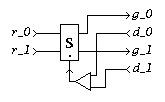EDIS:
Guide |
FAQ |
New |
Search |
Bibliography |
Index |
Feedback
RGD Arbiter
Informal
an RGD Arbiter has four input terminals
(r_0, d_0, r_1, and d_1)
and two output terminals (g_0 and g_1).
For each i in {0,1},
signaling starts with r_i followed by a repetition of
g_i then concurrently d_i and r_i.
The intervals from g_0 to d_0 and from g_1 to d_1
are mutually exclusive (do not overlap).
RGD stands for Request (r_i), Grant (g_i), and
Done (d_i).
When An RGD Arbiter receives two requests,
it will grant exactly one of them (and delay the other).
The specification leaves the choice open.
Often there is a fairness requirement
on this choice:
if a choice situation arises `infinitely often'
then both outputs are chosen `infinitely often'.
Schematic diagram
for an RGD Arbiter:

[Zoom|FIG]
XDI state graph
for an RGD Arbiter:

[Zoom|FIG]
Specification in XDI model.
Specification in Verdect:
define RGD( r0?, g0!, d0?, r1?, g1!, d1? ) =
pref *[ r0?; g0!; ]
|| pref *[ r1?; g1!; ]
|| pref *[ g0!; d0? | g1!; d1? ]
end
Also available through this link
Specification in DI Algebra:
NAME = (RGD Arbiter)
I = { r0, d0, r1, d1 }
O = { g0, g1 }
RGD = [ r0? -> g0! ; [ d0? -> RGD, d1? -> CHAOS ],
r1? -> g1! ; [ d1? -> RGD, d0? -> CHAOS ],
d0? -> CHAOS, d1? -> CHAOS
]
.
Also available through this link
XDI Report.
The subscripts 0 and 1 can be interchanged systematically.
An RGD Arbiter is not output deterministic,
since there is an output choice in state 5.
The output nondeterminism is dynamic.



